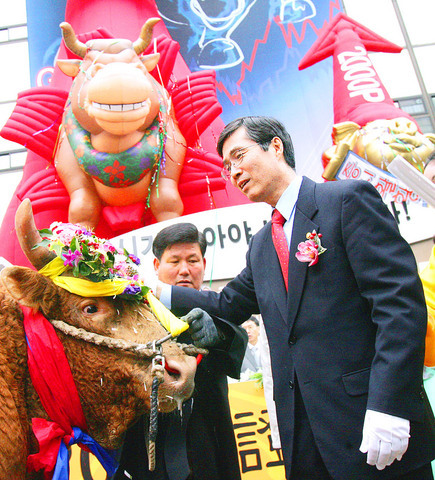Free trade agreements (FTA) with the US, Japan, China and Southeast Asia would put more than 100,000 South Koreans out of work over the next 10 years, a government estimate has said.
In a report submitted to parliament on Monday, the Ministry of Commerce, Industry and Energy said some 13,400 local companies would come under pressure to cut their work force amid mounting imports.
It was the first time that any government agency has published data on the estimated impact of the FTAs. Despite the forecast job losses, the ministry recommended pursuing the deals as a way to restructure the economy.

PHOTO: AP
"Survey results showed the impact on the country's industries would be great," the report was quoted as saying by Yonhap news agency.
South Korea has concluded an FTA with the ASEAN. Negotiations with the US resume this month amid disputes over the opening of Seoul's market for autos and pharmaceuticals and US anti-dumping measures.
South Korea also plans to enter talks on FTAs with Japan and China.
The report said the four FTAs would not only increase exports but also imports of cost-effective and high-end products from the three countries and ASEAN, pushing local businesses to either restructure or go under.
It said the service sector currently had much room for improvement and the manufacturing sector faced growing challenges from China and other emerging economies.
"We will aim to minimize losses from the FTAs and take this chance to turn industry around to become more competitive," the ministry said.
"We are still recommending FTAs as their benefits are greater than disadvantages," a ministry spokesman said.
Along with the report, the ministry asked for a budget of 1 billion won (US$1.1 million), including 760 million won for consulting services for the companies which would be hit hard by FTAs.
William Oberlin, chairman of the American Chamber of Commerce in Korea, said last week an FTA with the US would increase South Korea's economic output by 2 percent and create 500,000 new jobs. He gave no time frame.
Such an agreement would be the US' biggest deal since the NAFTA pact in 1994, marrying two economies whose bilateral trade totaled US$72 billion in 2005.
South Korea has seen a series of sometimes violent protests against any agreement, led by farmers who fear their lifestyle would be doomed by cheap imported food.

NEXT GENERATION: The four plants in the Central Taiwan Science Park, designated Fab 25, would consist of four 1.4-nanometer wafer manufacturing plants, TSMC said Taiwan Semiconductor Manufacturing Co (TSMC, 台積電) plans to begin construction of four new plants later this year, with the aim to officially launch production of 2-nanometer semiconductor wafers by late 2028, Central Taiwan Science Park Bureau director-general Hsu Maw-shin (許茂新) said. Hsu made the announcement at an event on Friday evening celebrating the Central Taiwan Science Park’s 22nd anniversary. The second phase of the park’s expansion would commence with the initial construction of water detention ponds and other structures aimed at soil and water conservation, Hsu said. TSMC has officially leased the land, with the Central Taiwan Science Park having handed over the

The Philippines is working behind the scenes to enhance its defensive cooperation with Taiwan, the Washington Post said in a report published on Monday. “It would be hiding from the obvious to say that Taiwan’s security will not affect us,” Philippine Secretary of National Defense Gilbert Teodoro Jr told the paper in an interview on Thursday last week. Although there has been no formal change to the Philippines’ diplomatic stance on recognizing Taiwan, Manila is increasingly concerned about Chinese encroachment in the South China Sea, the report said. The number of Chinese vessels in the seas around the Philippines, as well as Chinese

AUKUS: The Australian Ambassador to the US said his country is working with the Pentagon and he is confident that submarine issues will be resolved Australian Ambassador to the US Kevin Rudd on Friday said that if Taiwan were to fall to China’s occupation, it would unleash China’s military capacities and capabilities more broadly. He also said his country is working with the Pentagon on the US Department of Defense’s review of the AUKUS submarine project and is confident that all issues raised will be resolved. Rudd, who served as Australian prime minister from 2007 to 2010 and for three months in 2013, made the remarks at the Aspen Security Forum in Colorado and stressed the longstanding US-Australia alliance and his close relationship with the US Undersecretary

‘WORLD WAR III’: Republican Representative Marjorie Taylor Greene said the aid would inflame tensions, but her amendment was rejected 421 votes against six The US House of Representatives on Friday passed the Department of Defense Appropriations Act for fiscal 2026, which includes US$500 million for Taiwan. The bill, which totals US$831.5 billion in discretionary spending, passed in a 221-209 vote. According to the bill, the funds for Taiwan would be administered by the US Defense Security Cooperation Agency and would remain available through Sept. 30, 2027, for the Taiwan Security Cooperation Initiative. The legislation authorizes the US Secretary of Defense, with the agreement of the US Secretary of State, to use the funds to assist Taiwan in procuring defense articles and services, and military training. Republican Representative